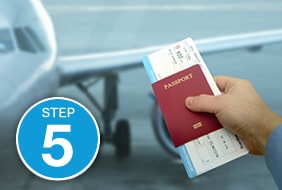5 Steps to Study Abroad Success

Adapting to New Surroundings
Coping with Culture Shock
The most effective way to cope with culture shock is to step back from a given event that has bothered you, assess it, and search for an appropriate explanation and response.Try the following:
1. Observe how others are acting in the same situation
2. Describe the situation, what it means to you, and your response to it
3. Ask a local resident or someone with extensive experience how they would have handled the situation and what it means in the host culture
4. Plan how you might act in this or similar situations in the future
5. Test the new behavior and evaluate how well it works
6. Decide how you can apply what you have learned the next time you find yourself in a similar situation
Throughout the period of cultural adaptation, take good care of yourself. Read a book or rent a movie in your native language, take a short trip if possible, exercise and get plenty of rest, write a letter or telephone home, eat good food, and do things you enjoy with friends. Also, take special notice of things you enjoy about living in the host culture.
Although it can be disconcerting and a little scary, the shock gradually eases as you begin to understand the new culture. It is useful to realize that often the reactions and perceptions of others toward youand you toward themare not personal evaluations but are based on a clash of cultural values. The more skilled you become in recognizing how and when cultural values and behaviors are likely to come in conflict, the easier it becomes to make adjustments that can help you avoid serious difficulties.
Contact Programs and Learn More
Search More Schools
Recommended for You
Apply to degree programs in the United States!
Now with ApplyESL GRADUATE, you can research and apply to a degree program in the United States. Begin your search today! It's always a good idea to prepare ahead of time.
Talk with the School!
Now you can choose your program, get in touch with the staff, and receive the information you need to get started.
Studying English at an American University Campus
Do you want to experience what it's like to be a real student in the United States? Studying English at a university is a great option. You can choose from many famous schools such as UCLA and Columbia University and enjoy living and learning on a university campus.
Choose the Best School for You
Choosing an English program is now possible without going through a study abroad agent! Here we will explain the importance of the 'Do-It-Yourself' application process!
Enjoying Life in the Country
Experience the great beauty of the countryside and the intimacy of small towns in America. Feel the kindness of the American people while studying in the traditional heartland of the United States.
Introducing Comments from ApplyESL.com Students
Learn from Experience! Successful Applications with ApplyESL.com
Trending Schools
Find the Most Popular Schools!







